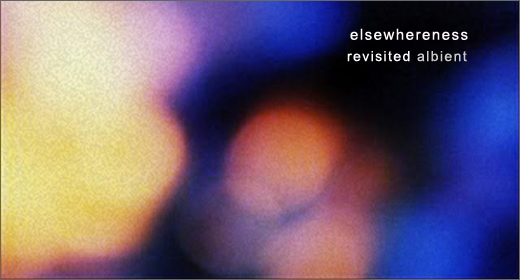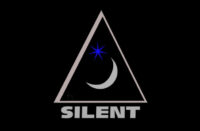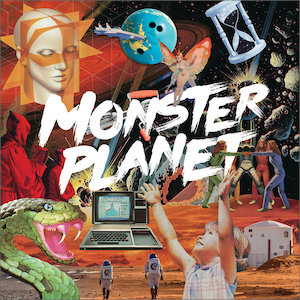Elsewhereness revisited is an occasional feature documenting the drift at the margins: ambient gasbagging and blurb blather, ’tube-d, ’cloud-ed, and ’camp-ed up, complete with companion mix, Elsewhereness revisited #10.
William Basinski‘s latest outing, On Time Out of Time, is a suite of works commissioned for the ‘ER=EPR’ and ‘Orbihedron’ installations by Evelina Domnitch and Dmitry Gelfand for the Limits of Knowing exhibition at Martin-Gropius-Bau, Berlin. Not one for small gestures, Basinski takes recordings made with the Interferometers of LIGO (Laser Interferometer Gravitational-Wave Observatory) at MIT capturing the sound of the merging of two distant massive black holes 1.3 billion years ago, and turns them into two pieces of musical mesmerism; the 40-minute title track not yet with us, the more concise and consonant “4(E+D)4(ER=EPR),” nine minutes of a live track drawn from said installation, serves as a compelling teaser. While we’re ‘here,’ lest we forget Selva Oscura, wherein Bill shacks up with Larry for the first fruit of a half-decade’s communing. The reference to Dante’s Inferno (Nel mezzo del cammin di nostra vita mi ritrovai per una selva oscura, ché la diritta via era smarrita—Midway through the journey of our life I found myself in a forest dark, for the direct path had been lost) may bespeak topographic and temporal displacement, mirrored in its alien drift, but also serves as a signifier of the serendipity of Basinski’s encounters with English over the years. Outcome of a deconstructed sonic palette, magnified and inverted from macro to micro and back again, via a shuttle of files between LA and Brisbane, it sweeps over vast tracts of shifting terrain, sounds constantly granularly re-arranged to render a broader tapestry of glacial narcosis, two extended pieces mapping an acoustic territory drawing on the concept of the strange-familiar drift in a shifting, yet constant state of unfolding. Temporary Residence hosts.
Having closed in on end-of-year fecund as ever with the elegantly designed detritus of Falling from Mind over MIDI and Andrew Sherwell’s mighty murky Ektenia, Shimmering Moods saw it out with Olan Mill and Sounds of a New Father, inelegantly billed as ‘a paean to the whole baby-sleep thing’ (note: along with variations on the letter H, this is Alex Smalley’s last release as Olan Mill, a body of work stretching back 7 years or so) and Thet Liturgiske Owäsendet with Novemberregn, recorded live with minimal editing, ‘eight tracks of beautiful, contemplative, Autumnal melancholy, of memories of what we have had and lost, and thoughts on what might yet come to pass,’ and more from the mopey Muse of Paw Grabowski, adding to his burgeoning øjeRum catalog with A Certain Grief. Never-sleeping SM sees in 2019, ironically, with Music For Sleep and Andrea Porcu mixing harmonic resonance with subtle drone over deep water explorations on Waterforms, a long-form piece that purportedly, when listened to with a certain attention, ‘will transport you to another dimension, without moving from your chair.’ That’s this year’s holiday sorted, budget intact. Similarly inclined to the more auditory end of SM’s ambit is Silent Odes from so-called ‘Afro diaspora artist,’ Luna Monk, ‘launching various emotions on various objects to transmit waves and messages from the Afro space age,’ made of captures from Welsh valleys and the Lake District—the naturalistic flow of water, hymns, and other peaceful explorations under gentle mesmeric melodies. And finally, Purl & Yamaoka (Ludvig Cimbrelius and Kenichi Oka) make Sculpture out of arrays of hazy pianoid tinkle and diverse ambient textures, along with more beaty reflections like “Jaiburo.” Philippe Blache is all over this with his own igloo-’view too.
Ex Confusion: not perhaps a name that resonates, though the sound—lone guitar via analog gear with modern FX to glaze/gauze—certainly does. And previous on U-Cover, Rural Colours, Plancha, and Orchid Tapes, two n5md albums, Embrace and With Love, and a handful of comp contributions, notably …And Darkness Came and For Nihon and a near-decade of operations show this Tokyo Joe—Atsuhito, actually—is no tyro. For his latest, I Remember When, another in Ambient music’s fat file of fixation with memory, he layers altered guitar into remote shimmering arcs; like the slow fade of image-music-text captured on ageing media carriers, it bespeaks transience. From the abrasive “Forgiveness” through the lachrymose “Tears” to the disintegrative “She Waited For You,” always returning, no drone left unturned. A communion with fellow nostalgia-phile, Benoît Pioulard, “I Owe The Earth A Body,” is all semiotic swirls coalescing and dissipating. “What I Miss Most” delicately smears into “Your Touch” in a washed-out sustain-release blur for a heartstring-tug coda.
Black Swan with more ‘drones for bleeding hearts,’ as the somewhat knowing byline goes, in the form of The Sentimental Drift. The opening “Birth” sets a keynote with a warm amniotic tenor that intensifies the deeper it goes, a tenebrous tinge late in the day. Sonic fragments display incipient traces of decay in front of us, bridging a chasm between harmony and the destruction of that harmony. The reels go round, spooling out a series of somber melodic veils with long delay tails and echo trails. BS conducts his ethereal symphony with a shadowy gravitas, musical and emotional, though contrasting with the more aloof tenor of some of his discography. The music grows, lows, ascends and bends towards the light till the finale, the 17-minute abyssal plunge of “The Black Room,” descends ever deeper through swathes of shifting clouds.
Lest we forget, from late last year came Slow spark, soft spoke extended vinyl edition courtesy of cute boutique-y Belgians at Dauw. History? Fresh from The Benoît Pioulard Listening Matter (Kranky, 2016), the artist known as Benoît Pioulard left for Europe to promote said album, a tour taking him to places ranging from urban Brussels to rural France and the remote Reykjavik. Once returned to Seattle, these impressions and memories provided food for musical thought, yielding Ss, ss. Initially released on tape, it flew off the Dauw shelves, prompting a raft of re-issue requests, leading to this vinyl repress. In a vein akin to his Lignin Poise (vinyl re-press by Beacon Sound), swathes and smears of slow-mo guitar map emotional oceanism in lo-fi tones, flooded with tape saturated simulacra of distant waves. Gorgeous sad-happy narratives sonified with slender means. Come-on in the form of two bijou newies presented as a single, Athanasy, 1993, amplifies the siren lure of its winsome warble and wooze.
Across the late ’00s, the blurb story goes, a series of ambient recordings from Tomasz Bednarczyk effectively married ‘the instability of archival technologies’ with ‘an extensive palette of pastoral timbres,’ and ‘quietly set a particular tenor of work for a new generation of Mid-Eastern European ambienteers.’ Blurb man might be onto something there (that or on something), but anyway after this Bednarczyk’s energies were diverted, split between various techno-oriented outings till he found a way back with his recent New Rome project, via which we find him now exploring a new approach to more atmospheric works; with a radically reductive set-up, we’re told, ‘he took single sources and exploded their potentials so that he was able to create minimal, yet dense sound textures through a process of layering and synthesis.’ This approach is evident on Illustrations For Those Who on Room40, each piece singular in terms of its source, the results forming a cohesive whole, with each maintaining a detailed and rich sensibility built around complex cycling of sonic materials.
KrysaliSound is aimed, as well as promoting owner Francis M. Gri‘s projects under a single brand, at being open to all audio-visual forms, for artists with philosophies outside musical convention. Two releases are covered here, the first from Kobe-based Hirotaka Shirotsubaki, who ‘uses sampled guitars to create dreamy landscapes and emotional textures moving the listener in a quiet and safe inner dwelling,’ we’re told. Faint nausea at that ‘dreamy’ notwithstanding, we know we’re safe having encountered his Wet Petals (Naviar, 2017)—equipoise over noise, yet free from twee—in ER #4. His Last Goodbye comes with an affecting byline: ‘My life was with this “Heisei” era. In order to live a new era with one break at the end of this era while I am alive, I have decided the title of this album to be “last goodbye” with a determination of parting. The 6 tracks that make up this album have my memory fragments scattered around.’ Bless. Next, a Dane proving great in terms of the swell of his øjeRum catalog, Paw Grabowski affirms his status as an artist of refinement with The Forest Is Sleeping Within The Trees, originally released by Scissor Tail, remastered and reissued by KS; piano and pump organ collude in a sort of spiritual research in ‘a deep combination of human desolation, devotion and fragility’—ideal for Basinski buffs seeking more ready-made Melancholia and all that pian-tastic disintegrating loop jazz.
Lest you missed The Green Kingdom‘s Expanses five years ago, Dronarivm has provided a re-issue, expanded with ten rethinks, Expanses Remixes. According to Michael Cottone, his homage to classic ambient and ambient techno (albeit passed through the filter of dusty samples from old vinyl and classical records, the odd guitar melody, electronics and some soft rhythmic pulses) had taken taken on a life of its own, reaching a larger than expected audience through particularly fortuitous circumstances; a slightly otherworldly, mysterious, album within TGK’s oeuvre, back in print with a bonus album of diverse creative mixes from artists such as Tobias Hellkvist, Hotel Neon, Warmth, Auburn Lull, Segue, and Halftribe.
Forest Management‘s Passageways, ode to his childhood home, a secluded apartment complex managed by his parents whose various eponymous connections ‘seemed to be endless corridors into discovery and imagination as much as to how time’s passage overtakes our perception of spaces,’ is his most personal work yet. Full of submerged melodies, gentle pulls of surging tonal shifts that arc, shimmer and fade into a dark purple hue of shifting overtones, it evokes how John Daniel ‘as a young kid […] would adventure around the apartment building and its surrounding property.’ A place to which the artist attributes much of his early imagination and creativity, he observes ‘…the idea of your home no longer being there is strange, but change is necessary. This home was simply a “passageway” into the life that I live now. … A sense of sentimentality about home, about a place and time.’ Cincinnati’s Whited Sepulchre provides.
ASC is back (in fact he’s back so often you’d never know he’d been away) with one of his beatless outings, offering evocative and engulfing compositions that navigate the dark v. light binary beloved of ambient scribes deficient in descriptors, rendering these tired tags otiose. With the The Waves James Clements sparsely populates a pelagic setting with harmonised drone limned with aqua-static soft noise, staying shy of sometime frequented grey areas, favoring an “Endless Blue” mood. Silent Season curates.
Scott Campbell may be known to producers and sound design gearheads for his DIY tape manipulation devices (viz. Onde Magnétique) and possibly for timbral creations as half of Bell Mountain. His recent Photos From The Flood was inspired by the remains of a family photo collection transformed by a parental house flood in Louisiana in summer 2016. Awash with muffled cameos, decaying melodies weave in and out of each soaked and sunken song, mirroring the warped state of the photo albums which left artist and family struggling to see beauty through destruction in the floods’ aftermath. Though many of the pictures were ruined, their colors had run into beautiful abstractions. Like a glimpse of a half-life, with the subtle suggestivity of song and lost rehearsal tapes of gauzy folk tunes, PFTF conveys a warmth, melancholy, and associated sense of loss. ‘An excellent representation of the nostalgia which ephemera often contain. Manages to blur the lines of joy and loss in a gentle manner.’ (W A R E N S I A N S, bc) Specialists in soundtracking physical manifestations of personal nostalgia, 79Ancestors, present.
New project, Iluiteq, from Italian experimental vets Sergio Calzoni and Andrea Bellucci, known for projects such as Orghanon, Colloquio, Red Sector A, and Subterranean Source, release debut album, Soundtracks For Winter Departures. First listen reveals classic ambient drone, distinguished by meticulous sound design, smooth harmonic arrangements and a palette deploying a wide range of sampling and synthesis techniques, enhanced by guitar, piano and field recordings. ‘Instilled by the colours of winter, the music evokes the act of leaving for uncertain destinations, a collection of soundtracks for winter departures.’ …TXT Recordings delivers.
After a hyper-productive 2018, with a slew of full-lengths and a brew of mixes and features for online radio station NTS, Mancy mood-swinger Sangam sees in 2019 with more ‘ambient portraits of social dysfunction, depression and heartbreak’ (The Wire). You Make Me, a third full length for Kudatah (and 35th overall!) showcases his ‘deep hazy and soft sonic melancholia,’ enhanced by a guest-collab from Tokyo bo-homie, Yoshimi, on finale “Anon Solitude,” driving the album’s ‘holistic concept of isolation’ even further. His extensive use of foley, ASMR and familiar public environments blended with rich layers of lush otherworldly atmospheres make for a familiar yet futuristic sound world that pulls you in. And from late last year there’s Vitality on Pure Life: tender melodies circle in the air and evaporate like smoke with signature style overlapping synth loops that grow, entangle and fade over the cityscape. ‘These tracks suggest a survivor’s mindset: acceptance, clarity, new perspectives and moving forward. But the memories remain…,’ prompts the blurb. Can’t vouch for that; mastering by CMD094 is safe, though. Latest, Aspect, via Aurawire, alas, has the dubious honor of most banal blurb of the month award: ‘Sangam continues his beautiful ambient drones with subtle, dreamlike moments scattered about. Aspect tells a story of a relationship gone wrong with heartfelt meanings buried deep into each song, making listeners feel like they’re going on a journey deep through their deepest feelings and emotions.’ Blah. Vaporware ≠ vapid text?
Xièxie (Chinese: 谢谢 – English = thank you) appears to be a kind of impressionistic audio travelogue of Will Long’s sojourn in China, setting out ‘A week before leaving, I bought a dictionary and phrasebook. Covered in rain, during the days and even the nights, Shanghai was lit in a glow, a mist turning to a constant grey fog. Buildings lined with neon and lcd screens flashed, and from around corners and behind buildings, the night was illuminated much the same as the day. Cars separated the classes, their horns voices punctuating the streets, as pedestrians in groups loosely scattered the streets, talking and walking on speakerphone.’ Further reflections in dream-reality lost-in-translation mode follow, mirrored in its long-form neo-isolationist drift by Celer’s music, then pay-off: ‘I bought a dictionary and phrasebook, but “xièxie” was the only word I ever got to use.’ Physical release (2LP, 2CD or 2CS) on the artist’s own Two Acorns.
Following his Serenity Channel on Strange Rules and Patterns of Lust for Holy Geometry, ‘a dreamy, melodic package of four beautifully-written and caring impressions,’ and selected ambient works, Cordial alongside Angelo Harmsworth and Opening night with Forest Management, Dominic Coppola brings To Have Done Nothing courtesy of Austin TX’s Plush Organics, which trails it thus: ‘Immense warmth and low end coat these incredibly melodic recordings while the textural pops and clicks from tape hide underneath them. Emotional music that tends to slow down everything around you as it continuously washes and swells.’ Literally and metaphorically, a well-sustained body of work.
Mercy Within is billed by the artist known as Hilyard as ‘another chapter in my ongoing musical journey to find some peace of mind in this world’, and it succeeds in spadeszzz. Created in a solar-powered forest cabin in desolate winter months, it provides not only comfort for dark nights, cold isolation and fuel for pensive fire-gazing, but, bold claim from the man with the healing plan, ‘layers of my own grief and regret slowly peel away with this music to reveal the mercy and self forgiveness that lies within.’ All this and Angela Klimek aka Poemme too, who adds vox to “From Omens.” Stereoscenic, of Ambient Sleeping Pill fame, hosts. Szzzorted, then.
Jonas Munk (Manual) and Jason Kolb (Auburn Lull) like to dwell on their Billow Observatory albums, and their third, III: Chroma/Contour, with its ‘effervescent soundscapes, delay-laden instrumentation, shape-shifting aural textures and gently unfurling compositions,’ <snooze> is no different. Blurb blather is larded blowsy epithets—all ‘luxurious’ ambient music, ‘glistening guitar,’ ‘fluid chord progressions,’ ’emotion-rich movements’ and ‘synthesizer-fired 1980s’ new age. If that sets your pulse racing, you can calm down, as they ‘eschew the pulse and rhythm that defined the duo’s previous effort (II: Plains/Patterns) in favor of sparse melodic possibilities and a more abstract palette of sounds,’ though it’s teasingly proposed: ‘Chroma/Contour suggests looking both 20 years forward and twenty years back, while forgetting the present altogether.’ Sustaining the hype, suggestion is ‘there’s a conceptual dimension to several tracks on the album, with guitars, analog synths and voices mangled by samplers, computer software and a broken dictaphone into pure abstraction.’ The nature of the concept remains unclear, however, and, sleep-written promo text aside, though decent, it’s a somewhat safe, sometimes anodyne, affair.
Last chance saloon: For Tokyo world-builder, H. Takahashi, ‘the dissatisfaction with reality that I feel on a daily basis’ fuels his last set of serene micro-miniatures for Not Not Fun, Escapism, which does what it says on the tin with percolating synth patterns and minimal melodic fluorescence crafted into refractive audio-sculptures. Of H.T.’s touch NNF call it ‘hushed, precise, and prismatic, coaxing spectrums of illusion and bliss in its tinted glass spirals,’ mixing up a maxim: ‘Extreme tension produces extreme relaxation.’ Yeah, baby. || Positive Centre‘s The Leaf Switch sees his less techno-inclined voice channeled by the febrile Opal Tapes, which also has DIY cassette star, Angelo Harmsworth, bring a set of ‘seethingly bittersweet electronic stress tests’ (soundcloud) on Kompressor. || On their second album, Esam, French duo Ligovskoï pursue in-depth innerzone exploration with what Dutch imprint Field Records describes as ‘a painterly and romantic form of music,’ recalling ‘vast landscapes, abstract patterns and poetic movement.’
Last Orders: Purveyor of ‘broken music for happy people,’ autumna explores venues and avenues, gets us ‘lost in worlds filled with melancholia and memories of summer sunbeams,’ on the untranslatable hiraeth, and gives us an ‘often dark but always with a soft shimmer or hint of diamond dust’ sleep treatise, via his own September Harvest. || Bird flew (pun presumably intended) from Sean Curtis Patrick (split with Trevor Edmonds) is in here for a winsome vignette, “Marsh Wren Overhead,” (plus we like his visuals as well as his music, last sighted/cited in ER #3 and ER #1 || Ruben Void‘s snappy byline goes: ‘I find my inspiration mainly by making myself empty’ pausing only to qualify his ‘musical cartography of my psychological developments and conflicts’ with ‘I feel myself vibrating constantly between emptiness as a downward dragging melancholy and the ascension towards a cosmic vacuum full of infinite potential.’ If that fails to engage, the vibrant Belgian’s ‘field recordings, cosmic noise, lysergic guitar improvisations and lo-fi warped piano melting into dreamlike sonic landscapes’ may draw you into The Infinite Approximation‘s psychoactive collage-kid drone-ambient on Unfinished Monkey.













![Pole :: Tempus Remixes (Mute) — [concise]](https://igloomag.com/wp/wp-content/uploads/2025/04/pole-tempus-remixes_feat-75x75.jpg)






![Hasbeen :: Bunker Symphonies II (Clean Error) — [concise]](https://igloomag.com/wp/wp-content/uploads/2025/04/hasbeen-bunker-symphonies-ii_feat-75x75.jpg)

